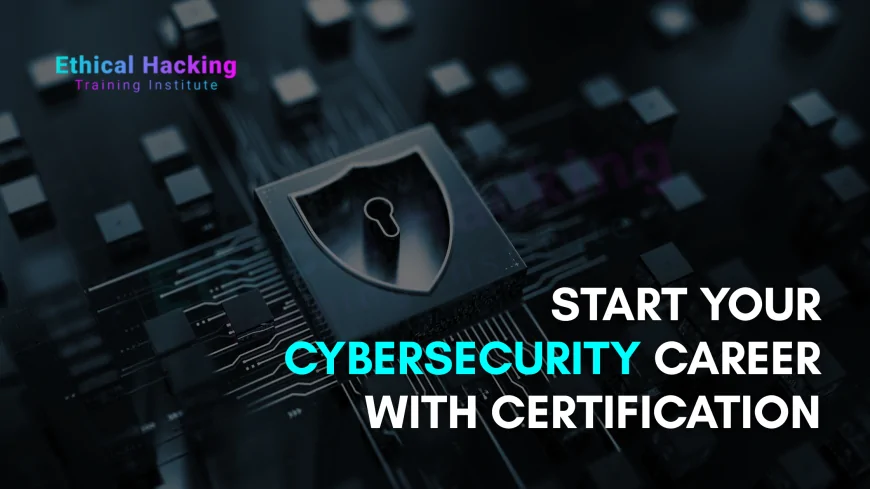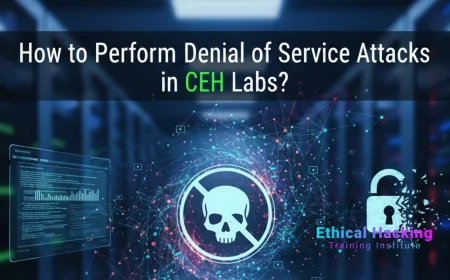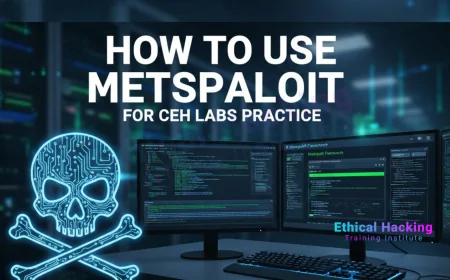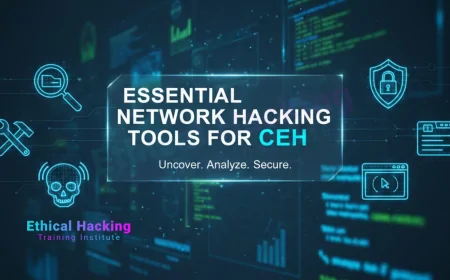How to Become a Certified Cybersecurity Expert in Pune | Step-by-Step Roadmap
Looking to build a career in cyber security? Discover top certifications, training programs, and expert tips to get cyber security certified in Pune. Learn how to choose the right course, gain practical skills, and land high-paying cybersecurity jobs in 2025.

Cybersecurity is one of the most critical domains in the modern digital economy. With the constant threat of cyberattacks, data breaches, and online fraud, the demand for certified cybersecurity professionals is skyrocketing. Pune, recognized as a major IT and educational hub in India, has become a top destination for aspiring cybersecurity experts. This blog explores how to get cyber security certified in Pune, offering insights that are unique, career-focused, and deeply practical.
Why Cybersecurity Certification Matters in 2025
In today’s threat landscape, certifications validate your knowledge and skillset, making you stand out in the competitive job market. Cybersecurity certifications:
-
Demonstrate your expertise to employers
-
Open doors to specialized roles like penetration tester, SOC analyst, and cyber defense consultant
-
Improve your salary potential
-
Increase job security
-
Build professional credibility
A certification in cybersecurity is not just a credential—it’s a stepping stone to a successful career in information security.
A Strategic Location for Cybersecurity Training
Pune's rapidly expanding tech ecosystem and access to renowned trainers make it an ideal city for cybersecurity training and certification. Here's why:
-
Pune houses hundreds of IT companies and startups seeking cybersecurity talent
-
Access to experienced industry professionals and training communities
-
Diverse student population including engineering, BCA, MCA, and IT graduates
-
Strong ecosystem for practical exposure and internships
Unique Benefits of Getting Cybersecurity Certified in Pune
1. Exposure to Real-World Threat Environments
Unlike theoretical programs, certifications pursued in Pune often include hands-on labs, cyber range simulations, and attack-defense scenarios. This real-world exposure helps learners build practical skills for incident response, vulnerability scanning, and malware analysis.
2. Modular Learning Paths for Flexibility
Many certification prep programs are modular, allowing students to choose learning tracks based on their interests—network security, cloud security, ethical hacking, or digital forensics. This helps tailor education to career goals.
3. Weekend and Evening Batches for Working Professionals
One of the unique offerings in Pune is the abundance of part-time and flexible schedules. Working professionals can choose evening or weekend classes that allow them to upskill without quitting their jobs.
4. Access to Certification Bootcamps
Cybersecurity bootcamps are immersive, short-term programs focused on specific certifications like CEH (Certified Ethical Hacker), CompTIA Security+, or CISSP. These are designed to fast-track your certification preparation.
5. Focus on Emerging Technologies
Courses in Pune are often updated with current topics like:
-
Cloud security (AWS, Azure, Google Cloud)
-
AI-driven security systems
-
Blockchain security
-
IoT device protection
-
Ransomware defense strategies
This makes your certification training highly relevant in 2025 and beyond.
Types of Cybersecurity Certifications You Can Pursue in Pune
1. Entry-Level Certifications
Ideal for beginners and students:
-
CompTIA Security+
-
EC-Council CEH (Certified Ethical Hacker)
-
Cisco CCNA Security
2. Intermediate Certifications
For those with some experience:
-
CompTIA CySA+ (Cybersecurity Analyst)
-
EC-Council CHFI (Computer Hacking Forensic Investigator)
-
GIAC Security Essentials (GSEC)
3. Advanced Certifications
Suitable for experienced professionals:
-
CISSP (Certified Information Systems Security Professional)
-
OSCP (Offensive Security Certified Professional)
-
CISM (Certified Information Security Manager)
How to Choose the Right Certification Path
Ask yourself:
-
Are you new to cybersecurity?
-
Do you prefer offensive (hacking) or defensive (protection) roles?
-
Are you aiming for management or technical tracks?
-
What are your long-term career goals?
Based on your answers, you can select:
-
CEH or OSCP if you're into ethical hacking
-
CISSP if you want to move into leadership roles
-
Security+ or CySA+ for foundational knowledge
What to Expect During Cybersecurity Training in Pune
Practical Lab Work
Hands-on labs with tools like Wireshark, Metasploit, Kali Linux, Burp Suite, and Nessus.
Scenario-Based Assignments
Solving real-world cases involving ransomware, phishing, DDoS, and firewall breaches.
Certification Exam Preparation
Guidance on exam patterns, mock tests, and question banks aligned with certification standards.
Peer Learning & Collaboration
Many courses include group activities, code audits, and red team vs. blue team exercises.
Capstone Projects
Build a security operations dashboard, perform vulnerability scans on test networks, or simulate ethical hacking scenarios as part of final assessments.
Career Opportunities After Certification
Cybersecurity certifications from Pune can lead to roles such as:
-
Cybersecurity Analyst
-
Network Security Engineer
-
Penetration Tester
-
Ethical Hacker
-
SOC Analyst
-
Malware Analyst
-
Cyber Forensics Expert
Salary Expectations in 2025
-
Entry-Level: INR 3.5L to 6L per annum
-
Mid-Level: INR 6L to 12L per annum
-
Advanced/Managerial: INR 15L to 30L per annum
How to Prepare for Cybersecurity Certification in Pune
1. Start with a Foundation Course
If you're new, begin with a course that covers computer networks, system security, and basic scripting.
2. Select a Specialization Early
Don't wait to narrow your focus. Choose your specialization (e.g., network security, pen testing) by the second month of training.
3. Practice on Labs and Capture The Flag (CTF) Platforms
Enroll in platforms like TryHackMe, Hack The Box, or Cyber Ranges provided by training programs in Pune.
4. Join Local Cybersecurity Groups or Forums
Engage with Pune-based cybersecurity communities, attend meetups, and participate in CTFs for networking and learning.
5. Set a Timeline for Certification Exams
Create a schedule and set milestones. Most certifications require 2–3 months of focused preparation.
6. Focus on Soft Skills Too
Cybersecurity professionals must also communicate findings, write reports, and work in teams. Courses in Pune integrate soft skill development.
Certification Success Stories from Pune
From IT Support to Ethical Hacker
A recent IT graduate started with a Security+ course, progressed to CEH, and now works as an Ethical Hacker in a Pune-based tech firm, earning twice their original salary.
From Career Switch to Cyber Forensics
A former BPO executive took part-time courses in cyber forensics and now works as an Incident Responder handling real-world breaches.
From Engineering Graduate to SOC Analyst
An engineering student with a focus on cybersecurity labs now manages Tier 1 alerts in a Security Operations Center.
Challenges to Overcome While Pursuing Certification
-
Time management, especially for working professionals
-
Keeping up with evolving threats and tools
-
Affording certification exam fees (some offer EMI options)
-
Avoiding burnout during intensive bootcamps
Tips to Maximize Your Learning
-
Attend workshops and cybersecurity hackathons
-
Use free and open-source security tools for practice
-
Read threat intelligence blogs and stay updated with vulnerabilities (CVE databases)
-
Ask questions and be active in your course community
FAQ's
1. What is the best way to get certified in cyber security in Pune?
The best way to get certified is by enrolling in a reputed ethical hacking training institute in Pune that offers practical hands-on experience, a comprehensive curriculum, and preparation for global certifications like CEH or CompTIA Security+. Look for courses with industry-aligned modules and real-world projects.
2. What are the benefits of getting a cyber security certification in Pune?
Cyber security certification boosts your credibility, enhances your technical skills, and opens doors to high-paying job roles. In Pune’s growing tech industry, certified professionals are in high demand for roles in penetration testing, SOC analysis, and network security.
3. Are there beginner-friendly cyber security certifications available in Pune?
Yes, many institutes in Pune offer beginner-friendly programs that start with fundamentals like network security, system protection, and ethical hacking basics. These certifications are ideal for freshers, students, and career changers.
4. What is the duration of cyber security certification courses in Pune?
Certification courses typically last between 1 to 6 months, depending on the course level (beginner to advanced), the mode (online/offline), and whether the classes are part-time or full-time. Evening and weekend batches are also available.
5. Is prior IT experience required to enroll in cyber security certification courses in Pune?
No prior IT experience is mandatory for entry-level courses. Most beginner courses start with basics, allowing students from non-technical backgrounds to learn essential cyber security skills and progress gradually toward advanced topics.
6. Which certifications are most valuable in Pune’s cyber security job market?
Globally recognized certifications like CEH (Certified Ethical Hacker), CompTIA Security+, CISSP, and OSCP hold high value in Pune’s job market. These certifications prove your ability to detect vulnerabilities, protect data, and secure networks.
7. Are online cyber security certifications accepted by employers in Pune?
Yes, reputable online certifications are widely accepted, especially when issued by well-known institutes or industry bodies. Employers focus more on practical skills and certification credibility than the learning format.
8. How much does it cost to get cyber security certified in Pune?
The cost ranges from ₹15,000 to ₹75,000 based on the course level, duration, and certification body. Short-term workshops may be cheaper, while international certifications like CEH or OSCP are priced higher due to their advanced content.
9. What topics are covered in cyber security certification courses?
Courses usually cover network security, ethical hacking, penetration testing, firewalls, malware analysis, cryptography, web application security, social engineering, and security compliance standards.
10. Do cyber security certification courses in Pune offer job placement assistance?
Yes, many ethical hacking institutes in Pune provide placement support, including resume building, interview preparation, mock tests, and direct recruitment opportunities through tie-ups with IT companies and startups.
11. Can I pursue a cyber security certification part-time in Pune?
Absolutely. Many training centers offer part-time, evening, or weekend batches to accommodate working professionals and students. This allows learners to balance certification with their existing commitments.
12. Are ethical hacking and cyber security certifications the same?
Not exactly. Ethical hacking is a specialized domain within cyber security. While ethical hacking focuses on finding and fixing vulnerabilities, broader cyber security certification covers risk management, compliance, and defensive techniques.
13. What tools will I learn in a cyber security course in Pune?
Students typically gain hands-on experience with tools like Kali Linux, Wireshark, Nmap, Metasploit, Burp Suite, Nessus, and Splunk—tools essential for ethical hacking, penetration testing, and network monitoring.
14. Is it worth getting cyber security certified in Pune?
Yes, with Pune being a major IT and industrial hub, certified cyber security professionals are in high demand. Certification enhances your skill set, boosts job prospects, and increases salary potential.
15. Can I get certified in cyber security after 12th in Pune?
Yes, many institutes in Pune accept students after 12th for diploma or certification programs in cyber security. These courses introduce foundational concepts and build the technical knowledge required for future specialization.
16. What are the job roles I can apply for after certification?
Post-certification, you can pursue roles like Cyber Security Analyst, Penetration Tester, SOC Analyst, Information Security Officer, Network Security Engineer, and Ethical Hacker. Certification significantly improves your chances of landing these roles.
17. Are there any internships after completing cyber security certification in Pune?
Yes, many institutes offer internship programs or industry projects after certification. These internships provide real-world exposure and improve your employability by allowing you to apply your skills in live environments.
18. What is the average salary after cyber security certification in Pune?
Entry-level professionals can expect salaries ranging from ₹3.5 to ₹6 LPA. With experience and additional certifications, salaries can reach ₹10–15 LPA in roles such as penetration tester, security consultant, or cyber risk analyst.
19. Can I upgrade to advanced certifications after completing a basic one in Pune?
Yes, most training paths are designed with progression in mind. After completing a basic certification, learners can pursue advanced certifications like CEH, OSCP, or CISSP to deepen their expertise and improve career prospects.
20. Are there live project opportunities in cyber security courses in Pune?
Yes, reputed training centers include live projects and simulations in their curriculum. These practical exercises replicate real-world attack scenarios and teach you how to defend systems using industry-relevant tools and methodologies.
Your Cybersecurity Journey Begins in Pune
Cybersecurity is more than a career—it's a mission to protect the digital world. Pune, with its vibrant IT ecosystem, offers the perfect launchpad for that mission. Getting certified here is more than earning a badge; it’s about becoming part of a global defense force against cyber threats.
Whether you're a student, IT professional, or a complete beginner, Pune's cybersecurity landscape offers flexible, practical, and up-to-date training programs designed to get you certified and job-ready. The time to start is now.
What's Your Reaction?
 Like
0
Like
0
 Dislike
0
Dislike
0
 Love
0
Love
0
 Funny
0
Funny
0
 Angry
0
Angry
0
 Sad
0
Sad
0
 Wow
0
Wow
0

















